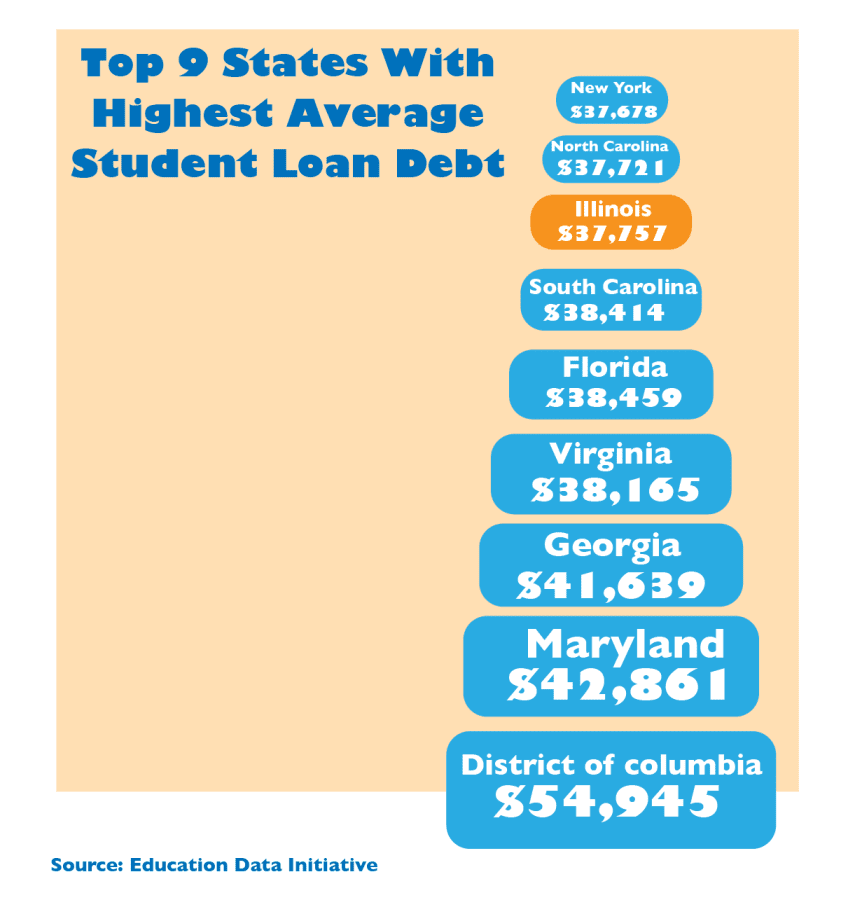Loan forgiveness excites students, generates more questions
August 31, 2022
Sarah Cho, junior in nursing, first heard about President Joe Biden’s student loan forgiveness plan when she was scrolling on TikTok. Cho immediately checked if she qualified because she said it seemed too good to be true.
“Honestly, I was just really thankful. I mean, anything helps,” Cho said. “Finding out that information (about qualifying) was a really, really good feeling for me.”
Biden announced on Wednesday that he will cancel $10,000 in federal student loan debt for individuals who earn less than $125,000 a year, or households that earn less than $250,000. For those who received a Federal Pell Grant to attend college, an additional $10,000 will be canceled.
In the 2019–2020 academic year, 23.4% of full-time undergraduate students at the University received a Pell Grant. The total amount of money distributed was nearly $40 million, according to data from the University.
Current students could qualify if they meet these income thresholds and their loans were issued before July 1.
Get The Daily Illini in your inbox!
Emmanuel Oteng Appiah, senior in LAS, said he’ll owe about $28,000 in student loans after graduating. Learning that he qualifies to have some of that debt canceled was exciting, he said.
But he still has questions about why college is so expensive in the first place. Oteng Appiah said ideas like free or reduced tuition should be discussed more.
“I think there are ways better than making us take out loans, and then forgive us,” he said. “Some even don’t get to pay all your loans until you probably die.”
The White House’s plan also extends student loan repayments for the last time until the end of 2022. Repayments were first paused in March 2020.
The University Office of Student Financial Aid said they’re still reviewing the information and what it means for students.
Economics experts are also concerned about the potential costs of this plan, such as how it could impact students’ future educational decisions.
“This changes whether people take out loans in the future, thinking that maybe the government will bail them out,” said Benjamin Marx, an associate professor in economics. “So they might be sort of encouraged to take out more loan aid than they really need going forward.”
Another concern for Marx is the application process that millions will have to undergo because the U.S. Department of Education might not have their income data. According to the Federal Student Aid site, 8 million borrowers may automatically see their balances updated. Everyone else should expect an application site to launch by October.
“When processes are complicated, people fall through the cracks and don’t get the benefits that they are entitled to,” Marx said.
Mahyar Kargar, an assistant professor of finance, said the people who most need this relief might not apply or even be aware of this news.
Kargar said he doesn’t think blanket forgiveness is the solution, either. One part of the policy that he said is a step in the right direction is the changes to income-driven repayment plans. Borrowers would only pay 5% of their earnings a month on these plans, down from 10%.
If the goal is to help low income people, IDR plans are a better policy than just blanket forgiveness, or even forgiveness with an income limit, Kargar said.
“The big elephant in the room is what do we do with the high costs of college? This has nothing to do to address the bigger problem, right?” he said.
Sasha Agafonova, a freshman in DGS, doesn’t qualify for loan forgiveness because her loans were distributed after July 1. Agafonova said she recognizes the value of a college degree, which is why loan forgiveness should be discussed.
“The demand to go into university and the demand for the job market for you to have a degree while applying is so much higher,” she said. “But at the same time, it is very ridiculous, because I’m going to probably be paying off these loans for the rest of my life.”
Cho said she’s happy about having some of her student loans forgiven, since her two siblings overlap in years at college. But she thinks there’s a deeper problem to be addressed.
“It makes me wonder why college is so expensive, that there have to be these things to help people out,” Cho said. “I hope that this isn’t the last step that’s taken to help out a lot of families.”







